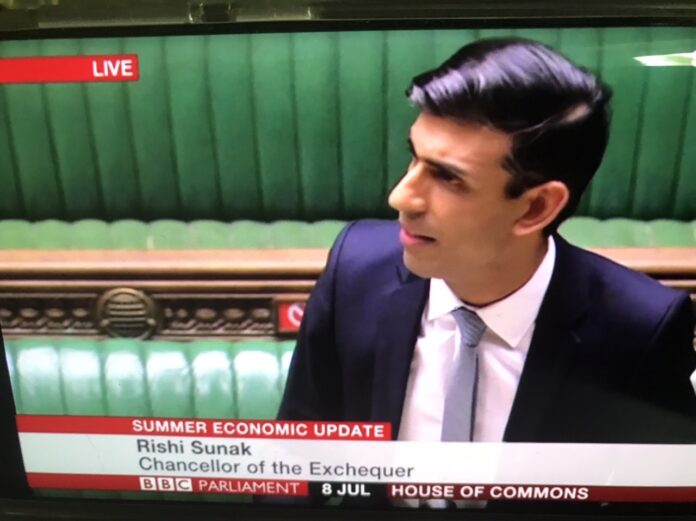The Chancellor Rishi Sunak has revealed his big spending plan to rescue the economy from the coronavirus-induced recession.
Beginning his statement by saying that people are anxious about losing their jobs in light of the coronavirus crisis, saying “we are not going to accept this” and that “although hardship lies ahead, no one will be left behind”.
The plan has a “clear goal to protect, support and create jobs.It will give businesses to create and retain jobs, support young people and give people everywhere “the opportunity of a fresh start” he told the House of Commons adding that the job has only just begun.
“Furlough, he says cannot and should not go on for ever.Calling for endless extensions is irresponsible and keeping it open” he added “is in no one’s long term interest.”
There will be a jobs retention bonus to employers who bring back furloughed people of £1000 and keep them employed until the end of January 2021.
He set out a three point plan for jobs. A new programme called the kick start scheme will pay employers to take on 16-24 year olds into good quality and decent jobs.Wages will be paid for six months and the scheme will start next month.This will amount to a grant worth around £6,500 per young person with £2bn is being made available now.There will be no cap on the number of places funded.
There will be a new £2,000 payment for firms to take on apprentices.
The number of work coaches in jobcentres is being doubled and the DWP will get an extra £1bn for this project.
On capital investment,the Chancellor said that there will be a £2 billion on a new green homes grant and there will be £1bn of funding to improve the energy efficiency of public buildings.The measures he says,should make 650,000 homes more energy efficient, saving families £300 a year.
Stamp Duty on House Sales, will be cut from today with the threshold increased to £500,000 until March 2021.
On hospitality and tourism, he has announced that VAT on food,hospitality and attraction to just 5 per cent until January 2021.In August there will be an “eat out to help out scheme”, offering customers a discount worth up to £10 per head when they eat on from Monday to Wednesday.
Dame Carolyn Fairbairn, CBI Director-General, said:
“The Chancellor is absolutely right to prioritise jobs in his summer statement. Flattening the daunting unemployment curve about to hit our country could not be more important. Joblessness scars lives and hits the young and most disadvantaged hardest.
“Today’s jobs plan is an important step forward. For young people, the Kickstarter Scheme will help create jobs in the short-run that can turn into opportunities for the long-run, and firms look forward to working with government to get it up and running quickly and well. It is also good to see direct support for apprenticeships and careers advice, which will help build the skills as well as the jobs of the future.
“New investment in green growth will spur job creation on the road to net zero, while revitalizing demand through targeted VAT cuts for hospitality, an imaginative voucher scheme and stamp duty relief will be warmly welcomed by many businesses and help give consumers confidence to spend.
“But prevention is better than cure. Many viable firms are facing maximum jeopardy right now. The job retention bonus will help firms protect jobs. But with nearly 70% of firms running low on cash, and three in four reporting lack of demand, more immediate direct support for firms, from grants to further business rates relief, is still urgently needed.
“The Chancellor must continue to balance the need to invest in a long-term, sustainable recovery while responding to the urgent challenges that companies are experiencing today.”
Helen Barnard, Acting Director of the Joseph Rowntree Foundation, said:
“The Chancellor has rightly announced a positive package of measures to tackle the risk of long-term youth unemployment and innovative policies to protect jobs in hospitality and tourism. As we chart a course to economic recovery, we must not repeat the mistakes of the past by adopting an “any job will do” mentality. An inclusive recovery that tackles poverty must target investment in skills and opportunities in areas with weaker economies and support those people bearing the brunt of furlough unwinding, job losses and reduction in hours.
“Now is the time to unleash a good jobs recovery which rights the wrong of in-work poverty by tackling low pay, insecure hours and lack of flexible employment. Investing in young people is welcome, but we also need a plan to address the barriers holding back women, people from ethnic minorities and disabled people in the labour market. We also need to ensure that workers over 25 receive the support they need to obtain skills to succeed in the changing jobs market and escape poverty.
“While the Chancellor’s statement looked to the future, we cannot lose sight of the fact that many families are being pulled deeper into poverty and debt right now despite the measures the government has already taken. We urge the Chancellor to urgently reconsider increasing the child element of Universal Credit and Child Tax Credits by £20 a week to help families stay afloat during this period of considerable anxiety.
“Only by doing all of this will the government deliver for low-income families who are going through the most serious crisis for generations and repay the trust many placed in the Conservative Party at the last election.”
Amy House, Low Carbon Lead at GC Business Growth, said: “This investment to decarbonise homes will put us on the right track to achieving our zero carbon emissions and will unlock wider benefits for the economy, saving money and increasing consumer spending. While healthier homes reduce the burden on the NHS and the creation of new skilled jobs will stimulate the UK’s economic recovery.
“The government’s commitment to cover up to £5,000 of the green upgrade, and in lower income homes funding up to £10,000, will be a huge incentive for many homeowners. However, barriers to participation could include the hassle factor, uncertainty of the benefits and impact on house valuations remain as challenges to overcome.
“Low carbon housing retrofit is one of the biggest challenges Greater Manchester faces in seeking to mitigate climate change and achieve its ambition of being carbon neutral by 2038. The city-region a high number of solid wall pre-1919 terraced properties, which are typically hard to retrofit. Therefore, this new scheme will form a welcome addition to Greater Manchester’s existing retrofit strategy.
“We are keen for the city-region’s SME supply chain to be part of the government’s list of accredited suppliers who will carry out this work and that these opportunities are accessible to our low carbon network members. Businesses can receive support through our dedicated green technologies and services sector support programme to ensure they get a slice of the pie.”
Frances O’Grady, the TUC general secretary, said there should have been targeted support for manufacturing sectors most at risk. She said:
Mass unemployment is now the biggest threat facing the UK, as shown by the thousands of job losses at British Airways, Airbus and elsewhere. The government must do far more to stem the rising tide of redundancies.
The chancellor should have announced targeted support for the hardest-hit sectors like manufacturing and aviation. Struggling businesses will need more than a one-off job retention bonus to survive and save jobs in the long-term.







